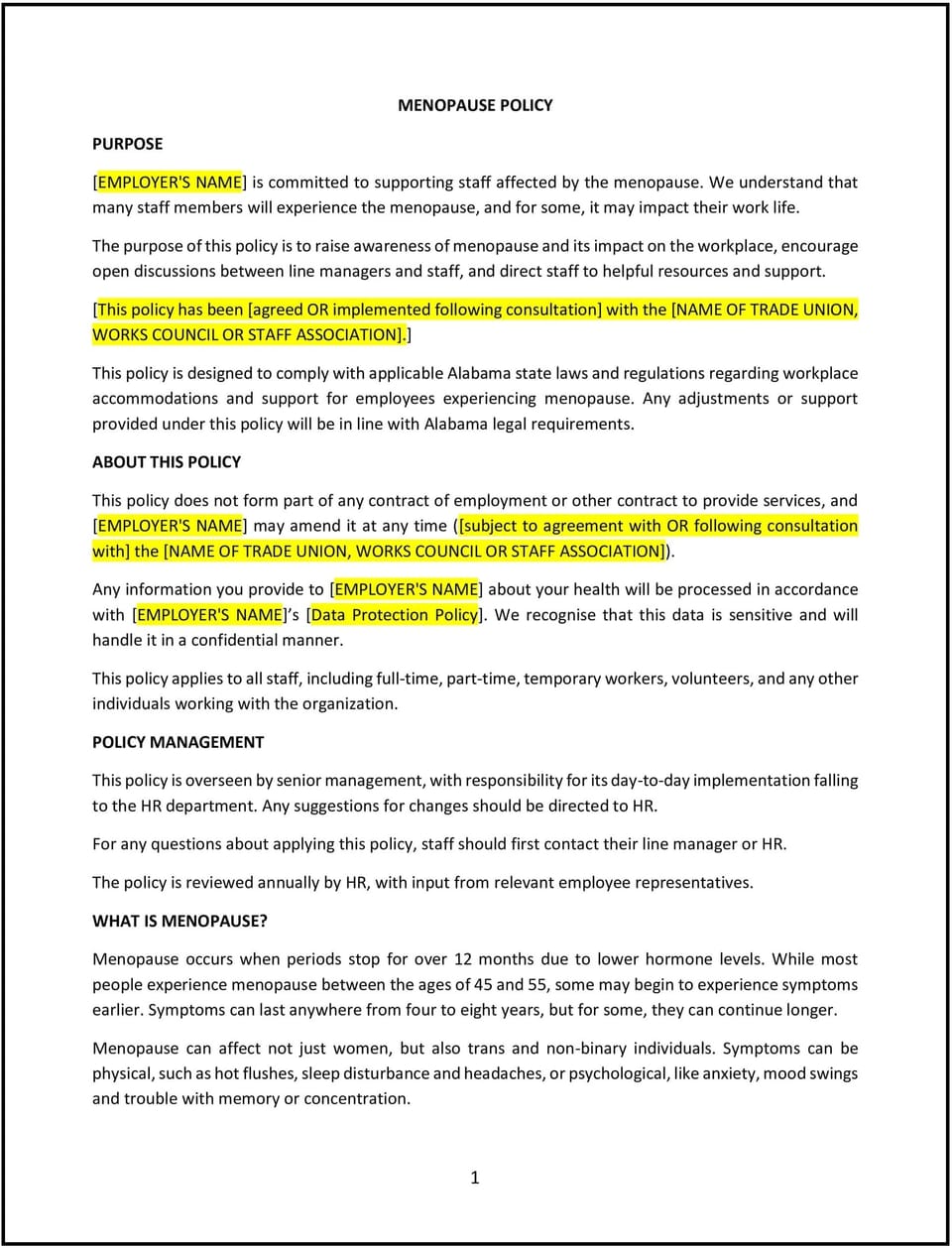Menopause policy (Alabama): Free template

Menopause policy (Alabama)
A menopause policy provides guidance and support for employees experiencing menopause and related symptoms in the workplace. For SMBs in Alabama, this policy demonstrates a commitment to fostering an inclusive and supportive environment by addressing the unique challenges that menopause can present.
This policy outlines accommodations, communication guidelines, and available resources, helping to promote well-being, reduce stigma, and ensure equal opportunities for employees affected by menopause.
How to use this menopause policy (Alabama)
- Acknowledge workplace impact: Recognize how menopause symptoms, such as hot flashes, fatigue, and concentration difficulties, can affect work performance and interactions.
- Provide flexible accommodations: Offer adjustments like flexible working hours, remote work options, or temperature-controlled environments to support affected employees.
- Foster open communication: Encourage employees to discuss their needs confidentially with HR or a designated point of contact without fear of discrimination.
- Include training and education: Educate managers and employees about menopause to promote understanding and reduce stigma in the workplace.
- Promote available resources: Highlight any employee assistance programs (EAPs), counseling services, or healthcare resources that can provide additional support.
Benefits of using a menopause policy (Alabama)
A menopause policy benefits your organization by supporting employee health and fostering an inclusive culture. Here’s how it helps:
- Enhances employee well-being: Provides practical support for employees experiencing menopause, reducing stress and discomfort.
- Promotes inclusivity: Demonstrates a commitment to gender equality and a supportive workplace for all employees.
- Reduces absenteeism: Helps employees manage symptoms effectively, minimizing the need for time off work.
- Improves productivity: Offers accommodations that enable employees to perform their roles without being hindered by menopause symptoms.
- Protects the business: Reduces the risk of discrimination claims by addressing menopause-related needs proactively and fairly.
Tips for implementing a menopause policy (Alabama)
- Raise awareness: Organize informational sessions or distribute educational materials to increase awareness and understanding of menopause in the workplace.
- Encourage supportive management: Train managers to recognize the potential impact of menopause and respond empathetically to employee needs.
- Offer tailored accommodations: Provide flexible solutions that address individual circumstances, such as modifying workstations or adjusting workloads.
- Maintain confidentiality: Ensure all discussions and accommodations related to menopause are handled discreetly to protect employee privacy.
- Review and adapt: Regularly assess the policy’s effectiveness and seek feedback from employees to make improvements where necessary.
Q: Why is a menopause policy important in the workplace?
A: A menopause policy acknowledges the challenges menopause can present and provides support to employees, fostering an inclusive and productive environment.
Q: What types of accommodations can be provided?
A: Accommodations may include flexible schedules, remote work options, access to temperature-controlled areas, and adjustments to workloads.
Q: How can employees request support under this policy?
A: Employees can confidentially discuss their needs with HR or a designated point of contact, who will work to implement appropriate accommodations.
Q: Does this policy apply to all employees?
A: Yes, the policy is designed to support any employee experiencing menopause-related challenges, regardless of role or seniority.
Q: How does the company promote awareness of menopause?
A: The company may provide training sessions, distribute educational materials, or incorporate menopause awareness into broader health and wellness initiatives.
Q: What steps are taken to protect employee privacy?
A: All discussions and records related to menopause accommodations are handled confidentially, with access limited to authorized personnel.
This article contains general legal information and does not contain legal advice. Cobrief is not a law firm or a substitute for an attorney or law firm. The law is complex and changes often. For legal advice, please ask a lawyer.


